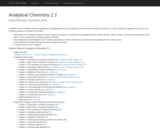
As currently taught in the United States, introductory courses in analytical chemistryemphasize quantitative (and sometimes qualitative) methods of analysis along with a heavydose of equilibrium chemistry. Analytical chemistry, however, is much more than a collection ofanalytical methods and an understanding of equilibrium chemistry; it is an approach to solvingchemical problems. Although equilibrium chemistry and analytical methods are important, theircoverage should not come at the expense of other equally important topics.
The introductory course in analytical chemistry is the ideal place in the undergraduate chemistry curriculum forexploring topics such as experimental design, sampling, calibration strategies, standardization,optimization, statistics, and the validation of experimental results. Analytical methods comeand go, but best practices for designing and validating analytical methods are universal. Becausechemistry is an experimental science it is essential that all chemistry students understand theimportance of making good measurements.
My goal in preparing this textbook is to find a more appropriate balance between theoryand practice, between “classical” and “modern” analytical methods, between analyzing samplesand collecting samples and preparing them for analysis, and between analytical methods anddata analysis. There is more material here than anyone can cover in one semester; it is myhope that the diversity of topics will meet the needs of different instructors, while, perhaps,suggesting some new topics to cover.
- Subject:
- Chemistry
- Physical Science
- Material Type:
- Textbook
- Provider:
- DePauw University
- Author:
- David Harvey
- Date Added:
- 06/20/2016